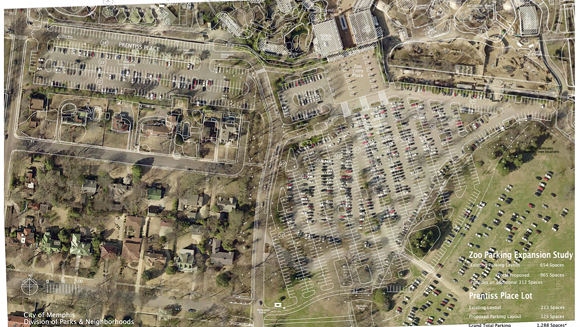Decisions will soon be made that will impact the future of Overton Park and the surrounding neighborhoods for years to come. These choices offer insights into our priorities as a city and how those priorities are determined.
In response to growing public outrage over the Memphis Zoo’s continued use of Overton Park’s Greensward for overflow parking, the Memphis City Council passed a resolution specifying parameters for a way forward. The resolution requires building 415 new “front-door” parking spaces that must conform to certain size minimums. It explicitly allows planners latitude to adjust the remaining design elements specified in the resolution.
The Overton Park Conservancy, neighborhood groups, and other supporters of Overton Park raised $1.5 million to support the project. Mayor Jim Strickland then convened a group to hire a designer (they chose Powers-Hill Design, P-HD) and to work out the details of the plan.
 City of Memphis
City of Memphis
This early draft of the Overton Park parking plan is one document that can be found on the city’s new web page.
P-HD submitted three concepts, each of which transfer almost three acres of parkland to the zoo, significantly more than park supporters understood would be required. Each option includes a “ring road” that places hundreds of moving vehicles per day within arm’s reach of park users. These plans are currently being revised. We ask that city planners consider a number of important questions before settling on a design:
How much parkland will be lost? By using efficient design, a good plan can be developed that costs the people of Memphis far less than three acres of parkland. Some citizen-generated designs even suggest that the resolution’s firm requirements can be met within the zoo lot’s current boundaries. Parks, green lines, and other natural amenities have been shown to attract talented young entrepreneurs and creatives. They are positively associated with health and wellness outcomes in urban populations. Will Memphis recognize the value of free public green space over pavement?
Will there be a ring road? The ring road supposedly addresses congestion, but in fact it just displaces traffic onto what is currently parkland, damaging park users’ experience in the process. Using “free” parkland to solve transportation challenges is reminiscent of the Tennessee Department of Transportation’s discredited and unsuccessful effort to run I-40 through Overton Park decades ago. Will Memphis embrace, protect, and preserve the park experience, or will we sacrifice it by using outdated approaches in an attempt to address traffic flow problems?
What creative measures will be used to address congestion? Developing the zoo entrance on North Parkway into a proper entrance gate would encourage the use of the 350 or so parking spaces there and in the Snowden school lot. This would keep hundreds of cars out of the park entirely. Raising the price of parking and eliminating free parking for zoo members would encourage visitors to walk, bike, bus, Uber, or park for free in Overton Park and nearby neighborhoods. Replacing pay-as-you-enter with pay kiosks or parking apps (as is done downtown and in Overton Square) would avoid backups caused by delays as drivers pay at the gate. Will Memphis reveal its innovative spirit to find creative new solutions?
Will we design with the future in mind? Urban planners tell us that in the next few years, self-driving cars and ride-sharing will become widespread, dramatically reducing the need for parking. Why sacrifice acres of parkland for parking when demand for parking is predicted to fall? Will Memphis be smart enough to plan ahead?
Will public preferences be considered when making major decisions like these? Mayor Strickland made public involvement and transparency a key part of this project. In response, scores of people have filed comments with P-HD, the vast majority of which argued for preservation of parkland, environmentally friendly low-impact development design, elimination of the ring road, and forward-thinking approaches to congestion. A petition advocating similar positions recently gained over 2,000 signatures in just a few days. The public clearly values parkland over pavement. Will Memphis listen and respond to park users’ input?
Memphis has a chance to take its place with forward-thinking cities all around the nation by embracing public green space, innovative traffic solutions, and public involvement. If we can do this project right, it’s a promising sign for our city’s future.
Eric Gottlieb has lived in Memphis since 1998. He administers the Facebook page, Stop Hurting Overton Park.